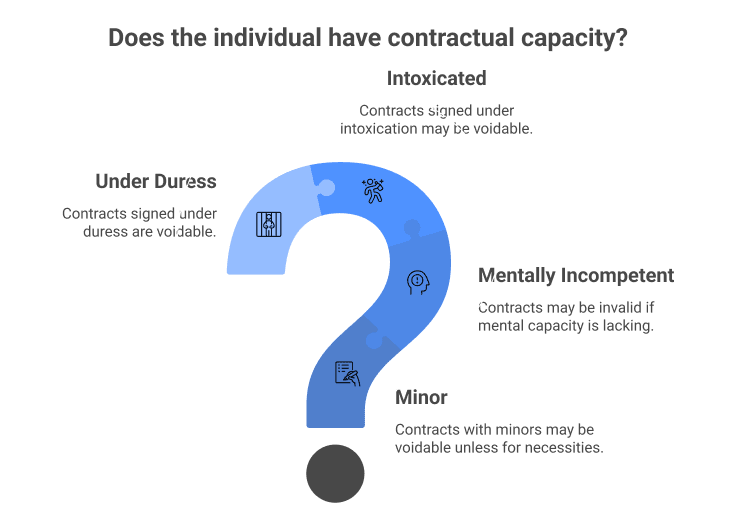Vansh Bhatnagar
Aug 5, 2025
Key Highlights
Contractual capacity ensures the legal ability of individuals or entities to bind themselves to contractual obligations under contract law.
Age of majority, mental competence, and authority are crucial legal requirements for determining legal capacity at the time of signing.
Individuals lacking mental capacity or suffering from cognitive impairment can compromise the nature of the contract’s validity.
Contracts can be classified as void or voidable, influencing legal consequences and contractual obligations.
Businesses must carefully assess requisite capacity to prevent legal battles and maintain enforceable agreements.
Leveraging contract management tools ensures compliance and clarity in verifying legal competence and preventing disputes.
In contract law, contractual capacity is very important. It helps us know if a person or a company has the legal ability to understand the deal, say yes, and handle all the contractual obligations listed in the agreement. If someone doesn't have the right capacity, the contract could be voidable, or it might not count at all. Knowing about contractual capacity helps you avoid fights over deals and keeps your business interests safe.
Understanding Contractual Capacity: The Basics

At its core, contractual capacity is about the legal ability a person or a group has to make agreements that are set and are binding under contract law. This means the people involved need to clearly understand the terms of a contract, what those terms mean, and what can happen after signing. If someone does not have the legal ability to agree, the contract may not stand in court. This can hurt everyone involved.
There are a few things that impact this legal ability, like age, whether someone is of sound mind, and if they have the right to enter into that agreement. These rules help protect people who may be taken advantage of and stop unfair or tricky agreements. Knowing about mental competence and the terms of a contract helps people see why some agreements work and others do not when looked at closely.
Defining Contractual Capacity
Contractual capacity means that someone has the legal competence to enter into a binding contract. It is important that the ability of an individual or a company to understand the nature of the contract is clear. If someone does not have the right mental state, has not reached the age of majority, or does not have the proper authority, the contract might not be valid under common law.
The law says that a contract needs a meeting of the minds. This means all parties need to understand the contract’s terms. People with mental disabilities, minors, or those under pressure to agree get extra protection by the law so they are not taken advantage of. If contracts are made when a person is forced or the person signing does not have clear authority, these contracts often get challenged.
For businesses, it is important to check the legal status of the company and make sure only the right people sign contracts. This will help avoid risk and help with contract management. Understanding these details helps show why contractual capacity is so important for making sure agreements can be enforced in different jobs and in different places.
Related Article: Reducing Contractual Liability with AI-Driven CLM
Why Contractual Capacity Matters in Everyday Agreements
Without contractual capacity, deals may not have power under the law. This means that agreements can be canceled. The main part of any binding agreement is that every party understands what they agree to at the time of signing.
Problems with capacity happen when people do not see the importance of contractual capacity. For example, if someone signs a contract while under cognitive impairment or does not have proper authority, promises may fall apart. This can create long and hard legal challenges. These issues can also hurt reputations and make business partnerships less strong.
In daily business, it is important to check if each party has the right capacity, so deals do not fail because of legal challenges that no one saw coming. When businesses focus on being clear and on all rules for a valid contract, they can handle hard deals better and move ahead with trust. Next, let’s look at the legal requirements that decide if someone has the requisite capacity for a contract.
Related Article: Contract Compliance: Importance & Best Practices
Legal Requirements for Contractual Capacity

Every valid contract in contract law must meet some important legal requirements. People taking part must have the right requisite capacity. This means that they need to have reached the age of majority, have mental competence, and also the proper authority. Because of these things, all parties can get into binding agreements in a fair way.
If these requirements are not met, there will be legal consequences. A contract can become either void or voidable. These outcomes show why you must check legal competence first, before signing any contract. Now, let's take a closer look at each factor, starting with the age of majority.
Age of Majority and Contract Law
The age of majority is the age when someone is seen as an adult in contract law. This age is often 18. Before this age, people are called minors, and their legal ability is different from that of adults. It is important to know that minors can sometimes sign contracts, but most time these deals can be canceled by them. This rule helps keep them safe under the law.
But there are some times when minors can’t just walk away from a contract. If the deal is about something they must have, like medical care or going to school, it may be treated differently. Courts will look at these cases to see if the deal is fair to the minor.
Criteria | Impact on Contracts |
|---|---|
Below 18 years old | Contracts are voidable unless exceptions for necessities apply. |
Age of majority attained | Minors cannot void contracts signed as adults. |
Contracts benefiting minors | Likely considered binding and fair. |
When a minor becomes an adult, it gets harder for them to cancel a deal they made as a kid. This is something companies need to remember if they want to make agreements with minors.
Mental Competence and Its Legal Assessment
Mental competence is important for having the ability to make a contract. Courts make tests to check if someone has the mental ability to understand a contract. If a person has a mental illness, another psychological issue, or is not able to think clearly at the time, a contract with them can be called either not valid or can be cancelled, depending on the situation.
A common way to check mental incapacity is the "appreciate effects test." This test looks at whether the person was aware of the nature of the contract and what it meant when they signed it. Some places use other methods, like checking if a person could control their actions or what drove them to agree. Still, courts can make the final choice about mental competence in each case.
It is important for businesses to use due diligence and watch for signs of mental incapacity. At the same time, they should not discriminate against people. Businesses should keep proper records and check the mental ability of everyone involved. This helps make sure that people are treated fairly and lowers the chance of breaking any laws while dealing with contracts.
Related Article: Contract Review Checklist: An Effective Guide
Who Typically Lacks Contractual Capacity?

Some groups in contract law do not have the ability to make contracts. These groups are minors, people with mental disabilities, people who are drunk, and workers who do not have the right permission. If these people sign a contract, it may not be valid because of the legal consequences.
This shows why contract management is important. Good contract management uses a set way to check if people can sign. If you know which situations make people unable to sign, you can protect your business from problems and money loss. Let’s look closer at these cases, starting with how age can make a difference.
1. The Impact of Age on Contractual Capacity
Age is seen as the main rule for deciding a person’s legal status, especially for minors. Those who are under the age of majority often have a different legal standing. The agreements they make can be undone, unless some exceptions are there.
If minors make deals for things they need, like shelter, education, or medical care, these contracts are usually valid, as long as the price or service has reasonable value. But if a contract is beyond what is needed, or it is signed under unfair terms, it may be undone.
It is important for businesses to always check how old someone is before making a deal. This is key in contract law. If a minor is part of the deal, they might later try to take the agreement back. To lower these risks, companies should follow the contract law protections.
2. Mental Competency: Understanding Its Role in Contracts
Mental competency means looking at if people have the mental ability to understand the terms of a contract and know what will happen if they agree to something. If someone has a mental illness, it can make the contract not valid or lead to legal challenges.
Different states use different ways, like cognitive or affective tests, to check mental capacity. While each may be a little different, they are there to see if a person could understand at the time of signing. This helps make sure that fair legal consequences can be enforced.
Businesses also have to check if a person may have an impairment before both sides finish a contract. This helps protect trust between people and stops problems that can come from voidable contracts.
3. The Influence of Intoxication on Contractual Agreements
Intoxication can have a strong impact on the legal ability of people to make and join binding agreements. This brings up questions about their mental capacity and if they are able to understand things clearly. If a person does not have the right mental state at the time of signing a contract, the contract might be made voidable or even void because of their condition.
Many legal challenges come up when there is doubt about whether the intoxicated person really understood the contract’s terms at the time of signing. This can lead to arguments about the implications of the agreement and who should be held to the rules set by the contractual obligations.
4. Legal Implications for Minors in Contractual Situations
Minors have a different legal status when they enter into contractual agreements. This is mainly because they do not have the full capacity to sign most contracts before reaching the age of majority. Most contracts with people under this age can be canceled by them, and they do not have to face any trouble for doing so.
This rule helps keep minors safe from risks like being used by others or making choices they do not understand. But there are some important cases when minors cannot break their deal, like contracts for things they really need, such as medical care. In these cases, the contract will stick to make sure they get support. It is important for both minors and adults to know how these rules about legal status and contracts work.
5. Identifying Duress: When Pressure Compromises Capacity
Duress happens when someone is forced to enter into a contract against their will. This can affect their legal ability to meet their contractual obligations. It is important to know about this, because duress stops the meeting of the minds needed for a valid contract. In law, a contract made when there is duress can be voidable.
This means the agreement might not hold if one person was forced or threatened. Coercion or threats can change a person’s mental state. So, it is important to notice and deal with duress in any contract. This helps make sure all people have legal competence when making agreements.
Related Article: Effective Contract Management: Key Strategies for Success
Why is Contractual Capacity Crucial?

Contractual capacity is important because it helps protect the people who are part of an agreement. It makes sure that they know what they are agreeing to do, so they are not taken advantage of. This also makes legal problems less likely to happen. When people have this kind of protection, they can trust each other more and take responsibility for their actions in the contract.
1. Protecting Vulnerable Parties
The protection of vulnerable people is a key part of contract law. There are some people who do not have the mental capacity that is needed to make binding agreements. These can include minors or people under the influence. They may not have the requisite capacity needed to enter into contracts. The law has rules in place to keep these people safe from being taken advantage of.
This is important for good business habits. It also shows that it matters to look at the mental state and legal ability of all people involved before making anyone take on any contractual obligations. It is important we look at these things to be fair and follow what contract law requires.
2. Avoiding Legal Disputes
A good understanding of contractual capacity is important to help stop legal disputes. When you make sure that all people in the contract have the needed legal ability, you can avoid a lot of confusion. If someone signs a contract and they do not have mental competence because of drinking or other problems, that contract can become void or voidable. That can bring expensive legal challenges. It is a good idea to use contract lifecycle management and get legal advice before you finish an agreement. This protects business interests and makes sure every party has the right legal ability for a binding agreement.
Related Article: Crafting the Perfect Statement of Work (SOW)
Conclusion
Understanding what contractual capacity means is important for both parties in a legal agreement. It helps protect the people who may not have the legal ability or mental competence to sign binding contracts. This can be people who are too young or may have mental incapacity. By knowing about the legal status and mental ability of each person, you can help stop future legal battles.
When parties know these details, it makes contract lifecycle management better. It helps everyone trust each other and keeps things clear. This way, both sides are able to make good choices that work well for their business interests.
Frequently Asked Questions
What happens if a minor signs a contract?
If a minor signs a contract, they often have the choice to cancel or keep the contract. When they become an adult, they can decide what to do with it. This rule helps protect minors by making sure the agreements do not hold them to things they might not understand.
How can mental incapacity be proven in court?
To show mental incapacity in court, you need to give medical proof. This can be from experts who talk about the case or from tests about the person’s mental state. It is important to have records that tell about the mental state of the person when the contract was made. This can help show they did not understand what they were doing.
Are verbal agreements valid if one party lacks capacity?
Verbal agreements may not be valid if one person does not have what is needed for a contract. The law might not see these deals as real. If there is a lack of capacity, it brings up questions about whether someone agreed or understood what was happening. This can make it hard to make these deals stick. It is good to get legal advice if you are in a situation like this.
Can companies lack contractual capacity?
Yes, companies can have no power to sign a contract if they do not have the right to do so, as written in their company rules. If a contract goes against the law, that would also be a problem. These things can make a contract not count or mean you cannot make someone follow it. This, in turn, affects the company’s legal standing and the things they must do.
What steps should I take if I suspect someone lacks capacity?
If you think someone does not have the ability to make choices, start by watching how they act and talk. After that, talk with them about your concerns or speak to a legal expert. Write down what you see that shows their struggles, so you can use these details later if needed. Always make sure their well-being comes first while you do all this.
About the Company
Volody AI CLM is an Agentic AI-powered Contract Lifecycle Management platform designed to eliminate manual contracting tasks, automate complex workflows, and deliver actionable insights. As a one-stop shop for all contract activities, it covers drafting, collaboration, negotiation, approvals, e-signature, compliance tracking, and renewals. Built with enterprise-grade security and no-code configuration, it meets the needs of the most complex global organizations. Volody AI CLM also includes AI-driven contract review and risk analysis, helping teams detect issues early and optimize terms. Trusted by Fortune 500 companies, high-growth startups, and government entities, it transforms contracts into strategic, data-driven business assets.








